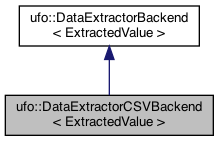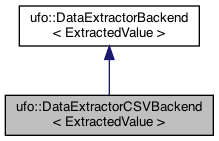Produces input for a DataExtractor by loading data from a CSV file. More...
#include <DataExtractorCSVBackend.h>


Public Member Functions | |
| DataExtractorCSVBackend (const std::string &filepath) | |
| Create a new instance. More... | |
| DataExtractorInput< ExtractedValue > | loadData (const std::string &payloadGroup) const override |
| Load data for subsequent extraction. More... | |
 Public Member Functions inherited from ufo::DataExtractorBackend< ExtractedValue > Public Member Functions inherited from ufo::DataExtractorBackend< ExtractedValue > | |
| virtual | ~DataExtractorBackend ()=default |
Private Attributes | |
| std::string | filepath_ |
Detailed Description
template<typename ExtractedValue>
class ufo::DataExtractorCSVBackend< ExtractedValue >
Produces input for a DataExtractor by loading data from a CSV file.
The file should have the following structure (described in more detail in the example below):
- First line: comma-separated column names in ioda-v1 style (
var@Group) or ioda-v2 style (Group/var) - Second line: comma-separated column data types (datetime, float, int or string)
- Further lines: comma-separated data entries The number of entries in each line should be the same.
Here's an example of a file that could be read by this backend and used for bias correction:
station_id@MetaData,air_pressure@MetaData,air_temperature@ObsBias string,float,float ABC,30000,0.1 ABC,60000,0.2 ABC,90000,0.3 XYZ,40000,0.4 XYZ,80000,0.5
One of the columns (above, air_temperature@ObsBias) contains the values to be extracted (also known as the payload). The payload column is identified by the group it belongs to, i.e. the part of its name following the @ sign (ioda-v1 style) or preceding the last / sign (ioda-v2 style); this group is specified in the call to the loadData() member function. The values from the other columns (coordinates) are compared against ObsSpace variables with the same names to determine the row or rows from which the payload value should be extracted for each observation. The details of this comparison (e.g. whether an exact match is required, the nearest match is used, or piecewise linear interpolation is performed) depend on how the class using the extracted data (e.g. the DrawValueFromFile ObsFunction) is configured. The data type of each column must match the data type of the corresponding ObsSpace variable. The type of the payload column should match the template parameter ExtractedValue, which must be set to either float, int or std::string. The column order does not matter.
Notes:
- A column containing channel numbers (which aren't stored in a separate ObsSpace variable) should be labelled
channel_number@MetaDataorMetaData/channel_number. - Single underscores serve as placeholders for missing values; for example, the following row
ABC,_,_
contains missing values in the second and third columns.
To continue the example above, suppose the file shown earlier is passed to the DrawValueFromFile ObsFunction configured in the following way:
name: DrawValueFromFile@ObsFunction
options:
file: ... # path to the CSV file
group: ObsBias # group with the payload variable
interpolation:
- name: station_id@MetaData
method: exact
- name: air_pressure@MetaData
method: linear
For an observation taken by station XYZ at pressure 60000 the function would be evaluated in the following way:
- First, find all rows in the CSV file with a value of
XYZin thestation_id@MetaDatacolumn. - Then take the values of the
air_pressure@MetaDataandair_temperature@ObsBiascolumns in these rows and use them to construct a piecewise linear interpolant. Evaluate this interpolant at pressure 60000. This produces the value of 0.45.
Refer to the documentation of the DrawValueFromFile ObsFunction for more information about the available extraction methods.
Definition at line 85 of file DataExtractorCSVBackend.h.
Constructor & Destructor Documentation
◆ DataExtractorCSVBackend()
|
explicit |
Create a new instance.
- Parameters
-
filepath Path to the CSV file that will be read by loadData().
Definition at line 176 of file DataExtractorCSVBackend.cc.
Member Function Documentation
◆ loadData()
|
overridevirtual |
Load data for subsequent extraction.
- Parameters
-
payloadGroup Group (e.g. ObsBias or ErrorVariance) containing the payload variable, i.e. the variable that will be interpolated. The data source must contain exactly one variable from this group.
- Returns
- An object encapsulating the payload variable, all coordinates indexing it and the mapping between dimensions of the payload array and coordinates.
Implements ufo::DataExtractorBackend< ExtractedValue >.
Definition at line 181 of file DataExtractorCSVBackend.cc.

Member Data Documentation
◆ filepath_
|
private |
Definition at line 95 of file DataExtractorCSVBackend.h.
The documentation for this class was generated from the following files: